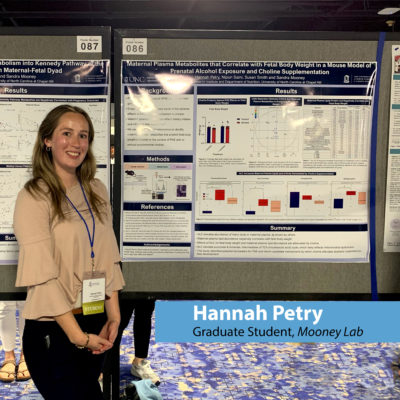Hannah Petry, a third-year doctoral student at the UNC Nutrition Research Institute, was recently awarded one of only eight prestigious travel awards. This award granted her the opportunity to present her groundbreaking research at the Fetal Alcohol Spectrum Disorders (FASD) Study Group meeting and the annual Research Society on Alcohol meeting, both held in Minneapolis, MN. Petry, who works in Dr. Sandra Mooney’s lab at the NRI, is dedicated to understanding the impact of nutrient intake during pregnancy on fetal brain development. Her research focuses on how alcohol consumption affects choline metabolism, a critical area of study given the essential role of choline in fetal development.
We sat down with Petry to learn more about her research and experience at these conferences.
Q: Can you briefly explain the research presented at the FASD Study Group meeting and the Annual Research Society on Alcohol meeting?
Petry: During pregnancy, nutrient requirements increase to support fetal development, particularly for nutrients that the mother’s body cannot produce. One such nutrient, choline, is essential for fetal brain development. Unfortunately, less than 10% of pregnant women meet the adequate intake (AI) requirements of consuming 450 mg of choline per day. Its absorption is further limited when pregnant individuals consume alcohol. However, little is known about how alcohol consumption during pregnancy impacts choline metabolism. To understand this, we performed a targeted metabolomics analysis in a mouse model of prenatal alcohol exposure (PAE). We discovered that PAE reduces the abundance of choline-derived metabolites that support DNA methylation and nucleotide synthesis, crucial for fetal development. Importantly, when PAE animals were supplemented with choline, the pathway attenuated by alcohol was rescued.
Q: What are the key findings from your research?
Petry: Our key finding is that alcohol impairs choline metabolism during pregnancy, but choline supplementation can partially remediate this impairment. This highlights the potential importance of choline supplementation for pregnant individuals, particularly those who consume alcohol.
Q: How did attending these meetings enhance your understanding of the field and your own research?
Petry: At the FASD Study Group Meeting, I enjoyed networking with FASD researchers from various backgrounds, including bench-top to clinical to community-wide research. Although my research focuses on biochemistry-based questions, meeting researchers who work directly with families, teachers, and healthcare providers caring for children with FASD allowed me to understand how our research can be practically applied and translated to the community. At the RSA meeting, I learned about different areas of alcohol research that I typically wouldn’t explore, which introduced me to new research techniques and analyses that I can apply to my work.
Q: How does participating in these meetings influence your future research and career goals?
Petry: Attending these conferences allowes me to explore different areas of alcohol research and potential career options. I participated in a grant writing workshop, where I could ask questions about the grant writing process to both experienced professors and NIH representatives. This experience was invaluable and will certainly influence my approach to future research and my career trajectory.
Petry’s recent award and recognition emphasizes the significance of her research in uncovering how alcohol impacts nutrient metabolism during pregnancy. Beyond advancing scientific understanding, her work has the potential to inform new strategies for improving maternal nutrition and fetal development, potentially shaping future public health policies and interventions.
Hannah Petry, a graduate student in the Mooney Lab, obtained her Bachelor of Science in Nutritional Sciences and Dietetics in May 2022 from Texas Tech University. She joined the NRI and began her doctoral studies in Fall 2022. Her research centers on fetal alcohol spectrum disorder (FASD).

